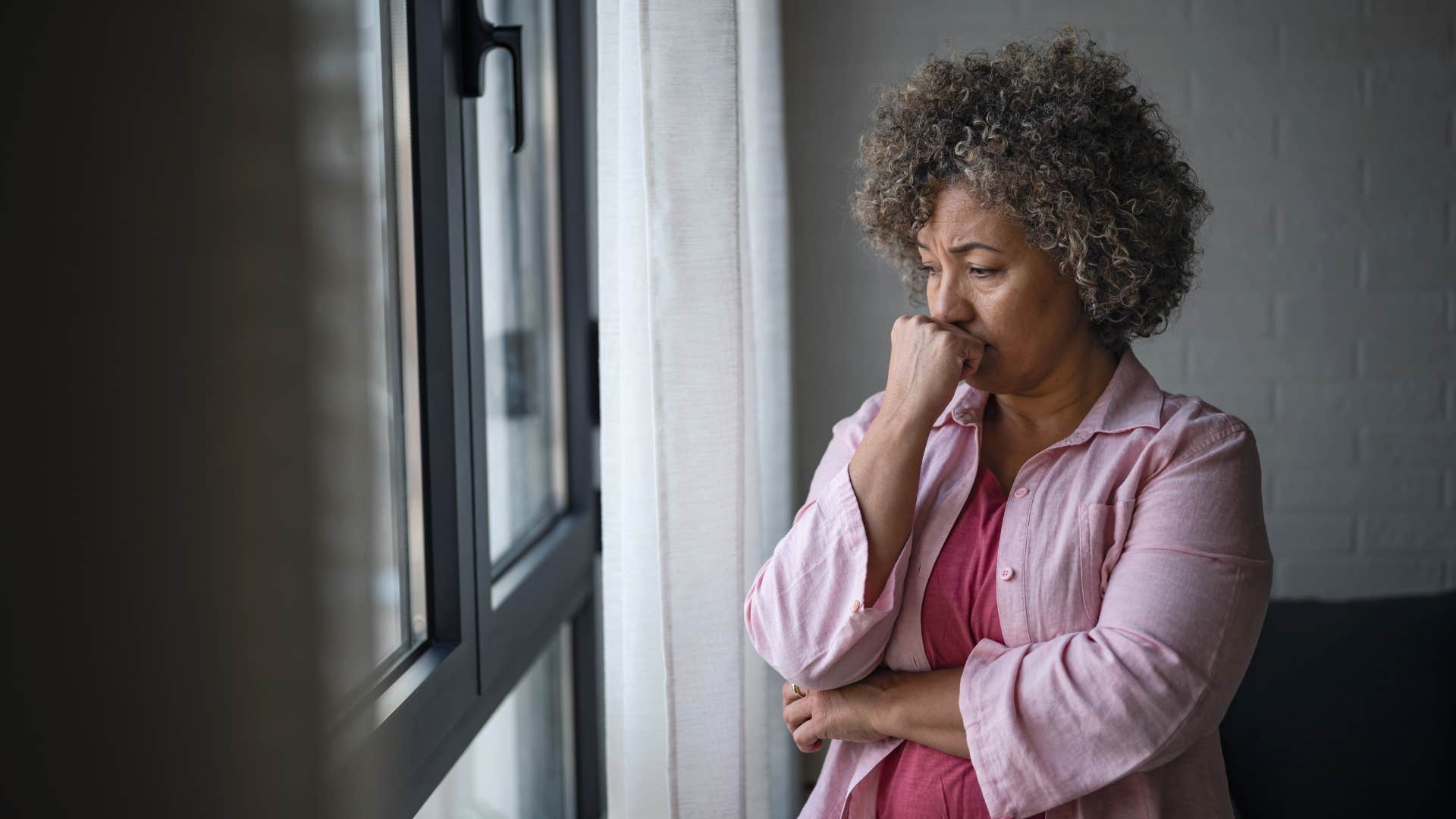If You Notice These 11 Things In Your Childhood Home, Your Parents Are Deeply Unhappy
Your parents' personal space can tell you a good deal about their emotional state.
 BearFotos / Shutterstock
BearFotos / Shutterstock The state of someone's living environment can offer a significant insight into any mental and emotional struggles they may be experiencing. If you notice that your childhood home is now filled with some particular things, it may be a sign that your parents are deeply unhappy and could use some extra support.
For example, if there are aspects of your childhood home that never change, or that change negatively, this might indicate that they are having a hard time adapting to life's challenges. It's important to pay attention to these things, and if you notice these signs of your parents' unhappiness, you should probably ask them more about how they are doing.
If you notice these 11 things in your childhood home, your parents are deeply unhappy
1. Excessive clutter
 fizkes / Shutterstock
fizkes / Shutterstock
If, while visiting your parents in your childhood home, you notice an excessive amount of clutter, this may be a sign that your parents are deeply unhappy. They may be struggling with something mentally that is making it difficult for them to feel motivated to even do the smaller things, like cleaning.
“Conditions like depression and anxiety can make finding the energy to organize and tidy up feel like a daunting task. This can lead to a cycle where clutter and poor mental health reinforce each other,” according to Calm, a platform dedicated to helping individuals manage stress and anxiety. The longer your parents live in the clutter, the harder it will be for them to gain motivation back and improve their mental health.
2. Abandoned projects
 fizkes / Shutterstock
fizkes / Shutterstock
While at your childhood home, if you notice that certain plans or projects have been abandoned, the unkept promises may be a sign that your parents are not as happy as you may have thought they were. Instead of following through with the promises they have made to others and themselves, if they decide to abandon these things, it may show that they are emotionally unavailable.
Failing to keep commitments can be a result of feeling emotionally overwhelmed and experiencing excessive stress. If your parents feel this way, they may start to only have the emotional capacity to manage their own struggles, causing them to dedicate more time to their own needs instead of to family and friends. This may put a strain on their relationships.
3. Unused items for their regular hobbies
 Perfect Wave / Shutterstock
Perfect Wave / Shutterstock
If there are several items lying around being unused that used to be part of their regular hobbies of your parents in your childhood home, your parents may be deeply unhappy. This could be a sign that they are searching for their identity beyond being a parent or struggling with their emotional energy.
They may feel lost and want to find themselves, but are struggling with overcoming their unhappiness enough to dedicate time and energy to the hobbies that could help them understand more about themselves or take productive breaks from reality when they are stressed..
4. Lack of upkeep
 Halfpoint / Shutterstock
Halfpoint / Shutterstock
If you notice that your parents are not taking care of the maintenance of your childhood home and there is a lack of upkeep, they may be struggling and feeling deeply unhappy. This could be the result of serious mental health challenges they have been facing or a shift in their priorities.
When your parents are experiencing extreme unhappiness, their focus may turn to managing their distress and dealing with the basics for survival. Maintenance and other upkeep on their home may no longer be a top priority for them. They may be consumed by emotional and mental struggles.
5. Unpaid bills
 fizkes / Shutterstock
fizkes / Shutterstock
If you notice unpaid bills in your childhood home, it may be a sign that your parents are deeply unhappy. If they are struggling mentally or financially, the amount of stress and anxiety these two struggles can create will likely lead to their unhappiness.
Experiencing these things can lead to feeling lower amounts of energy and a lack of motivation that could lead them to overlook necessary responsibilities, like bills. If you notice this, you may want to consider taking action to help your parents manage their finances.
“Managing elderly parents’ finances can be complex but rewarding when approached thoughtfully. By starting early, understanding legalities, and using tools like high-yield savings accounts, you can safeguard their financial future while reducing stress for everyone involved,” according to financial technology company Raisin.
6. Outdated appliances
 Hananeko_Studio / Shutterstock
Hananeko_Studio / Shutterstock
When you notice that your childhood home is still filled with outdated appliances, this could potentially be a sign that your parents are not very happy if they have just experienced a major change in their lives. They may be struggling with emotional attachment and a fear of letting go.
If they are still grieving a transition in their lives, they may try to hold onto things that remind them of the past. This can be emotionally unhealthy because it makes it difficult for your parents to truly embrace the future and it negatively impacts their quality of life and overall well-being. Not being able to embrace and visualize a positive future for themselves can also impact their ability to maintain relationships and protect their mental health, explains Annie Wright, a licensed marriage and family therapist.
7. Stagnant decor
 Lordn / Shutterstock
Lordn / Shutterstock
When you walk into your childhood home, if you notice stagnant decor, there is a possibility that your parents are struggling to be happy. Sometimes, this can be a physical depiction of the emotional stagnation they are experiencing.
If they are struggling mentally and emotionally, they may avoid making changes to their personal space. It may be their way of trying to hold on to the past because of their fear of confronting the changes in their lives. When someone is struggling with emotional stagnation, it is typical for them to get stuck in the past.
8. Memorial items
 fast-stock / Shutterstock
fast-stock / Shutterstock
When your childhood home contains many memorial items, it may be a sign that your parents are deeply unhappy. If they experienced a great loss, they may still be grieving, and their home may show signs of their unresolved pain.
While grieving is a normal process after losing a loved one, if you notice that your parents have been struggling with this process for an unhealthy amount of time, they may be dealing with more complications in their grieving.
“Complications manifest in extreme emotions or lack of emotions well beyond the acute phase of grief and duration of these emotions exceed normal process ranges. They prevent the person from moving forward and adjusting to the loss in a healthy way,” according to the American Institute of Health Care Professionals.
9. Dead or dying plants
 Gladskikh Tatiana / Shutterstock
Gladskikh Tatiana / Shutterstock
If you notice many dead or dying plants in your childhood home, there may be a chance that your parents are struggling to be happy. Neglecting plants can be a sign that your parents are neglecting other aspects of their lives, possibly due to stress or emotional distress.
When they no longer feel willing to put the time, energy, and care into maintaining their plants, it may show that their emotional state is limiting the amount of energy and motivation they have. While their mood is already being affected, having neglected plants throughout their home contributes more to these feelings because they are likely acting as mood killers that increase stress.
10. Out-of-date technology
 Rido / Shutterstock
Rido / Shutterstock
If your childhood home is filled with out-of-date technology, this could be linked to your parents’ unhappiness. Choosing to never update any technology within their home may be a sign that they are struggling with avoidant behavior.
If your parents struggle with anxiety when it comes to making decisions or trying to adapt to new things and changes, out-of-date technology may mean that they are emotionally distressed, and it will cause them to avoid change. Constantly feeling this and having troubles avoiding change make it difficult to embrace life and live it to the fullest, which may end up leaving your parents struggling with their mental health even more.
11. Several missed phone calls from family and friends
 Gladskikh Tatiana / Shutterstock
Gladskikh Tatiana / Shutterstock
If the phone in your childhood home has several missed phone calls from family and friends, it may be a sign that your parents are deeply unhappy. Numerous missed phone calls from loved ones may mean that your parents are socially isolating themselves due to emotional struggles.
This is especially true if your parents have typically always been good at communicating with others and very responsive. This unusual behavior may indicate that they are currently experiencing something that is causing them significant distress.
While some of these things in your childhood home may not be a sign of your parents' unhappiness, it typically comes down to patterns and what their normal behaviors look like. Drastic changes in behavior can be very telling of the mental and emotional state of an individual.
Kamryn Idol is a writer with a bachelor's degree in media and journalism who covers lifestyle, relationship, family, and wellness topics.

